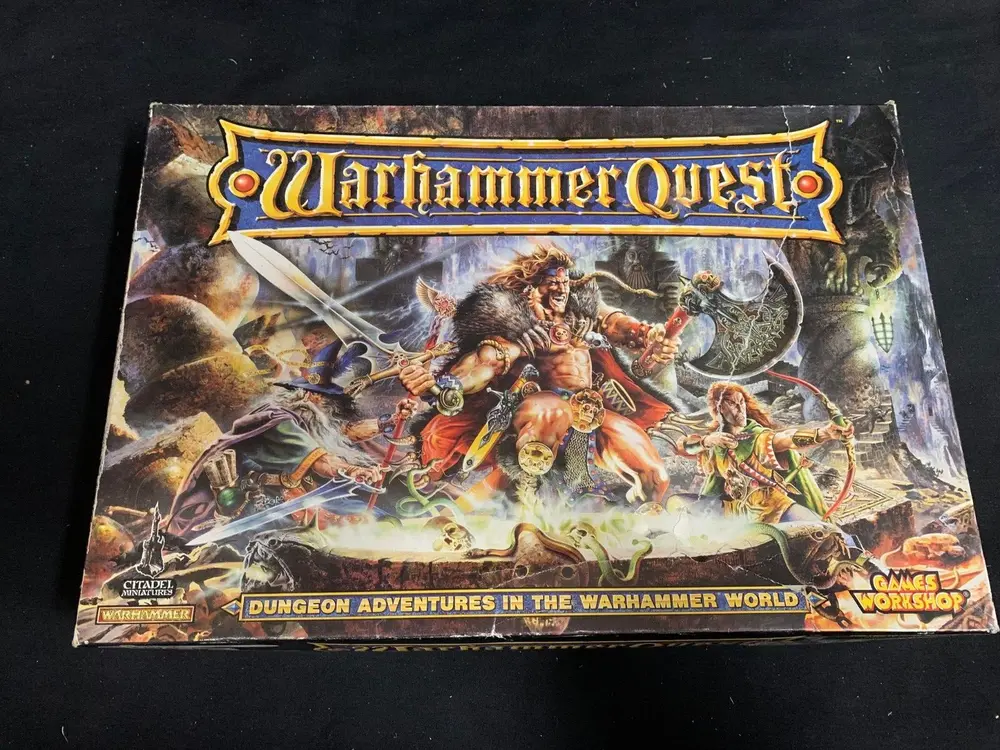Warhammer Quest (1995)
Warhammer Quest
Warhammer Quest is a fantasy dungeon, role-playing adventure board game released by Games Workshop in 1995 as the successor to HeroQuest and Advanced HeroQuest, set in its fictional Warhammer Fantasy world. The game focuses on a group of warriors who join forces to earn their fame and fortune in the darkest depths of the Old World. Games Workshop stopped producing Warhammer Quest in 1998, but eighteen years later, they released four new games in the series: Warhammer Quest: Silver Tower, Warhammer Quest: Shadows Over Hammerhal, Warhammer Quest: Blackstone Fortress, and Warhammer Quest: Cursed City. These games follow the original in overall design as dungeon crawling board games but with substantially different rulesets and are set in Games Workshop’s new fantasy setting, Warhammer Age of Sigmar.
Why is Warhammer Quest Popular?
Warhammer Quest is popular and significant for several reasons:
– It is set in the rich and detailed Warhammer Fantasy world, which has a large and dedicated fan base.
– The game utilizes a set of simple game mechanics to simulate the warriors’ actions as they explore and fight through dungeons, making it accessible to a wide range of players.
– It emphasizes cooperative and thoughtful play, requiring players to work together to survive against various monsters.
– The game’s “board” consists of twenty tiles (nine rooms and about eleven corridors) that can be fit together to create many different layouts, adding replayability and variety to the gameplay.
Game Components of Warhammer Quest
How To Setup Warhammer Quest
Setting up Warhammer Quest involves creating a random dungeon using the tile system. Players start by placing the initial room tiles and then draw cards to generate new rooms and encounters as they explore. Each turn begins with rolling for the “winds of magic” to determine the wizard’s magical capabilities, followed by character movement and combat phases.
Gameplay Mechanics and Game Objective
Player Experience
Warhammer Quest offers a highly variable and unpredictable experience. The game is known for its randomness, with outcomes determined by dice rolls and card draws. This can lead to dramatic victories or sudden, brutal defeats. As players progress, they can level up their characters, acquire better equipment, and tackle more challenging missions. However, the game’s reliance on randomness can also lead to frustration and a lack of real strategic choices.
Pros
Cons
Personal Thoughts on Warhammer Quest
Warhammer Quest is ideal for players who enjoy a fast-paced, action-packed dungeon crawler with a high level of randomness and unpredictability. It is perfect for those who love the Warhammer Fantasy universe and appreciate the visual appeal of miniatures and detailed tiles. However, players seeking deeper strategic options or more complex role-playing elements may find the game lacking. It’s a great choice for groups looking for a fun, cooperative experience without the need for a dedicated game master.
We are supported by our audience. When you purchase through links on our site, we may earn an affiliate commission, at no extra cost for you. Learn more.

